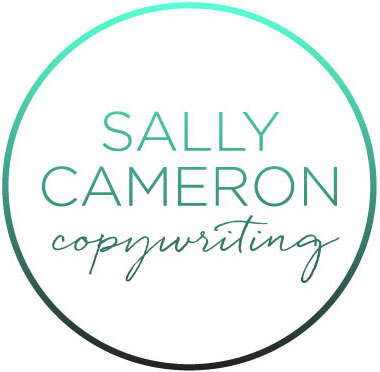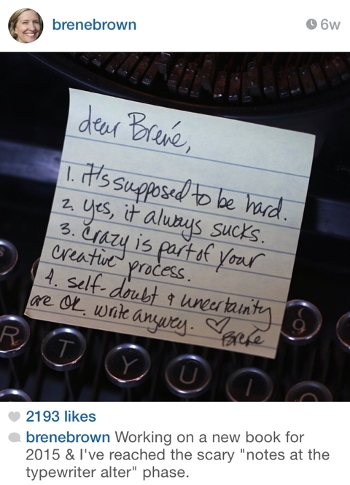Ah, Brene Brown. A woman after my own heart. If there’s anything that’s bound to bring up your innermost feelings of insecurity, inferiority and shame, it’s a blank Word document. That vacant white space and accusingly-blinking cursor can be a soul crusher, especially if words aren’t your thing.
Even us copywriters struggle to put pen to paper (or fingers to keyboard, as the case may be) more often than we might care to admit. While copy for clients usually comes relatively easy (thank goodness and touch wood!), I very nearly threw in the towel when it came to writing my own website copy. Ridiculous, right?! A quick scour of some fellow copywriters’ blogs though and I discovered I wasn’t alone. The pressure to get my own copy just right. To be original but not too zany. To say enough but not too much. All of this was majorly zapping my writing mojo.
So, what did I do to get some words down on paper so I could finally launch my site? Here are my top three tips to show that blank Word doc who’s boss:
1. Avoid any and all comparisons, full stop.
When you’re struggling to find the right words, the obvious temptation is to go and check out what ‘the others’ are doing. Trust me: don’t fall into this trap like I did. I lost hours trawling through the sites of copywriters I really admire, but gained nothing positive from doing so. The result? You end up replicating what’s already out there (and selling your own uniqueness short in the process) or you simply feel so inferior that you give up altogether. The lovely Alex, of Violet Gray Design, said, “Stop looking around – what you need is right there inside of you. Clarity comes when you step back. And if you take the time to look within and get clear on what makes you so special, the creations that flow through you will be divine, unique and reflect the YOU that everybody around your adores.” Wise lady, that Alex.
2. Instead, do something constructive.
If I wasn’t comparing, I inevitably ended up procrastinating by scrolling through Instagram, mindlessly pinning beautiful kitchens or filling my shopping cart with homewares I was never going to buy. Curse you, Down That Little Lane (but I still love you)! And, let it be said, you can only make and drink so many cups of tea in one day. But, often, doing something constructive clears the blockage and allows you to move forward. I found that stacking the dishwasher, organising my art supplies or going for a brisk walk around the block often prompted an initial sentence or another angle to pop into my head. And once you have that to work with, you can return to your laptop and get busy.
3. Just start.
Ultimately, when push comes to shove, sometimes you just have to push through and make yourself do it. I decided I needed a complete change of scenery, so I took myself off to my local library, found a bunch of uni students who were clearly being much more diligent than I was, sat my butt in that uncomfortable brown vinyl chair and made myself start typing. Yes, it felt forced and uncomfortable initially, but guess what? Just a few sentences in and the words started to flow. Not great words, but words nevertheless. The act of simply starting gave me the momentum to pump out a quick draft, then edit, refine and end up with something that I could publish with a bearable amount of excruciation. Unfortunately, there’s no magic pill. Sometimes, you’ve just gotta suck it up and start somewhere.
In Bird by Bird: Some Instructions on Writing and Life, Anne Lamott says, “Perfectionism is the voice of the oppressor, the enemy of the people. It will keep you cramped and insane your whole life, and it is the main obstacle between you and a shitty first draft. I think perfectionism is based on the obsessive belief that if you run carefully enough, hitting each stepping-stone just right, you won’t have to die. The truth is that you will die anyway and that a lot of people who aren’t even looking at their feet are going to do a whole lot better than you, and have a lot more fun while they’re doing it.” The lesson? Just start. Many great things have been borne from shitty first drafts.
And a bonus tip:
Frustratingly, I often find that the right words come to me (sometimes just a sentence, sometimes something much longer) just after lights out as I’m drifting towards sleep. Those slippery little suckers are always gone in the morning, so I now keep a notebook by my bed where I can scribble them down (sorry husband, for waking you up!). Read this in the morning, and I’m usually inspired to keep going and get it done. For more advice on this topic, I highly recommend fellow copywriter Jess Larsen’s eBook, Stop Wishing and Start Working. You can download it for free here.
Happy writing!




